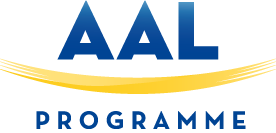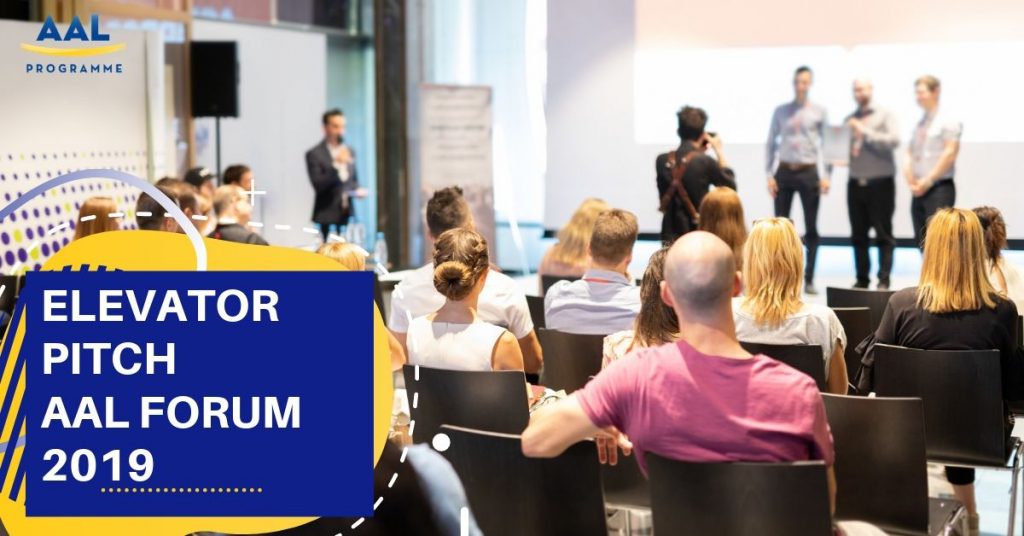Elevator Pitch
ELEVATOR PITCH
Wednesday 25 September 9:00-10:30
Room: Dania
This is a brand-new format that will be implemented at the AAL Forum 2019 in Aarhus.
The intention of the six elevator pitches is to spark interest across the audience and call for a separate debate and discussion with other interested participants. Presenters have six minutes to pitch their project.
Presentations
Developing robot-like eHealth solutions with end users in real life healthcare settings
Theme 1
Medical Delta Living Lab Care Robotics understand that there is often a gap between the development and the use of technology by older adults and caregivers which is why they are aiming to enhance a solution to cater for this problem.
This is a collaboration between universities and care institutions to develop and test new products together with end users in real life settings. The Living Lab follows a unique methodology with a mix of participatory action research and co-design, where social sciences are combined with engineering, and always patient, client, care professional and family-member centric. They also deal with ethics, legal issues and extensive assessments.
Medical Delta Living Lab Care Robotics offer applied research at care institutions in the Netherlands with some products piloted across Europe, and are interested in starting a collaborative project with like-minded parties.
Speakers:
MSc. Janneke Vervloed (PhD) and MSc. Erwin de Vlugt (Thuas & Medical Delta Living Labs)
Ad Blom (Innovation Program Manager of Pieter van Foreest)
Supporting active and healthy living among older adults through the use of animation
Theme 6
– presentation of the underlying rationale and two living cases.
In Viborg municipality we see animation as entertainment and stories for children but also as modern, engaging and democratic communication we actively use throughout our life.
Animation comes from the Latin, animatio, which means giving life or spirit – and this is at the core of Viborg municipality’s animation strategy. Here, animation is seen as a way to breath a new life into communication with the citizens and a way of implementing new solutions. Animation is an effective tool in explaining complex problems for everyone to understand, speaking to both the brain and the heart.
Two living cases will be shown as examples of animation that add value to public communication will be shown and key take-aways include:
– How to communicate visually rather than with words
– How to reach your audience and stepping out of the comfort zone in communicating to patients and citizens.
Speakers:
Henriette Svenstrup, Project Manager of Animation, Viborg Municipality
Digital design for the last stages of life: Thinking about ‘slow questions’
Theme 6
An end to life is inevitable. However, numerous aspects of passing have changed drastically over the last fifty years. The yearly number of deaths have doubled but so has the length of time people are aware of their life’s end. In these cases, it’s the medical questions which overshadow the more existential questions, but there is increasing awareness of the importance of the ‘slow questions’: Am I afraid of dying? What legacy am I leaving behind?
It is understood that people feel more empowered to make end of life decisions when they have thought, and talked about these questions however, unfortunately statistics show that 80 per cent of Dutch adults find it difficult to discuss topics surrounding death and dying.
We want to design a digital intervention for people in their last stages of life which facilitates the interaction between patients and loved ones and enables them to discuss ‘slow questions’ – with the goal of improving the quality of palliative care. Designing for the last stages of life is still complex as little is known about how people deal with existential questions during this period. To aid this development, experts from the creative industry and those in palliative care will be combined to create valuable experience design.
Speakers:
Dr. Teun Aalbers (GainPlay Studio)
Karin Alfenaar (U CREATE)
Intersecting the narratives of male caregivers
Theme 6
Re-doing gender, care and masculinity. Fluid experiences in the Basque Country
Despite the tendency of discussions around care being linked to the female sphere, it is our responsibility as researchers, policy makers and varying actors involved in the care sector to pay attention to emerging social dynamics. This presentation will address the lack of studies on male perceptions in care from an intersectionality analysis: beyond gender, class and experiences of racism and discrimination. I will focus on the experience of male immigrant caregivers in the Basque Country, Spain and as a result of their stories I have created three typologies of caring. This will aim to provide an insight of how male carers work today and how their insights and subjectivities might help to create and develop a clearer and broader understanding of care for society.
Speaker:
Julie Aguirre (University of the Basque Country)
Incontinence in older age: Preventing or coping with it through the help of digital tools
Theme 6
One in three persons will deal with incontinency problems during their life and most of them are elderly. In the Netherlands approximately 60 per cent of those that suffer from incontinence seek medical help, leaving 40 per cent who do not. The two main reasons for this being: 1) incontinence is a taboo which leads to people, 2) not speaking about it and remaining uninformed about how it can be treated.
We believe eHealth is a great tool in solving both problems. People can anonymously ask about incontinence and find information about proper treatment, helping to life part of its taboo. To take this further, we hope to learn and collaborate with other countries on this issue very prevalent in older adults.
Speakers:
Mark Slager (Pharmacist and Member of the National Work Group on Personalised Incontinence Care)
Willem-Jan Renger (Director, HKU Innovationstudio)
Karin Alfenaar (Innovation Connector, U CREATE, Centre of Expertise Future Health Design, and Member of the National Work Group on Personalised Incontinence Care)

